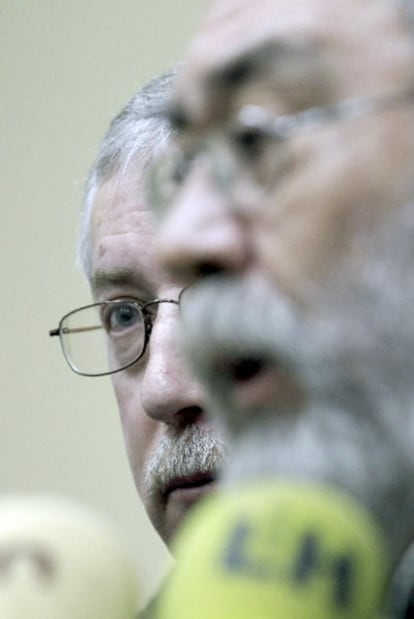Unions reject any bargaining over nuclear plants in exchange for pact
UGT and CCOO threaten to "take to the streets" if no accord is reached
Labor leaders on Thursday firmly rejected a notion that they were willing to negotiate to extend the operations at the nation's nuclear power plants to protect workers' jobs in exchange for supporting the government's proposed social pact, which includes pension reform.
Cándido Méndez of the UGT and Fernández Toxo of CCOO called the notion "grotesque" and "foolish." Their rejection came a day after Industry Minister Miguel Sebastián said that the Socialist government would be receptive to analyzing a proposal, if the unions presented it, to extend the life of nuclear power plants as part of ongoing negotiations for an overarching agreement on social and economic policies.
Sebastián made his remarks during a radio interview after a news report surfaced in La Vanguardia on Wednesday that the nuclear plants were one of the government's bargaining chips in talks with the unions.
"It looks like someone inside the government is working to derail the pact," said Méndez.
The energy proposal sent to the unions for their consideration, a copy of which was obtained by EL PAÍS, does not envision extensions for any of Spain's eight nuclear reactors, which today provide 22 percent of the country's energy needs. In fact, the three-page document shows that Spain's nuclear energy dependence should be reduced by seven percent, or 56,600 gigawatts, by 2020.
This difference would represent the closure of Garoña in Burgos, which the government has pledged to close in 2013. Sebastián clarified that Garoña could not be included in any social and economic pact.
Two years ago, Prime Minister José Luis Rodríguez Zapatero said the government would close Garoña, the smallest and oldest of all of Spain's plants in 2013, giving it a two-year extension after workers and their families protested the planned closure in 2011, when it is to reach its 40th year in operation.
The Socialists have promised they would continue to close other plants that reach their 40-year lifespan, but the opposition Popular Party (PP) has vowed to extend the lives of some when they come to office.
While both unions have denied that they have received a copy of the government's energy proposal, sources at the prime minister's La Moncloa residence said that the offer to keep the plants open to protect union jobs is on the table.
Zapatero's government is under a self-imposed January 29 deadline to come up with a broad social and economic pact with the unions, business leaders and political allies. He is offering to make changes in his labor reform package if the unions support economic policies, including his plan to push the retirement age from 65 to 67. The unions have said they are willing to discuss all the options but haven't budged on changes to the retirement age. The leaders said that if there is no agreement they will "go out on the streets" to defend their positions.
Guillermo Fernández Vara, the regional premier of Extremadura, said "he would be inclined to agree" if the government wants to change its long-held policy on nuclear power. Fernández, a Socialist, said the issue needs to be debated among members of his party. "Some things need rethinking," he said.
The Almaraz plant, located in his region and which produces enough energy for four million households, was given a 10-year license last year by the Nuclear Atomic Commission (CAN) to continue operating.
PP Secretary General María Dolores de Cospedal said that it was "unfortunate" that the government was involved in "trading picture cards" to achieve an agreement on pensions.
In Congress, the ERC Catalan leftist party said that it will ask Sebastián to explain before lawmakers what exactly the government's position is on the inclusion of nuclear plants as part of the pact talks.

Tu suscripción se está usando en otro dispositivo
¿Quieres añadir otro usuario a tu suscripción?
Si continúas leyendo en este dispositivo, no se podrá leer en el otro.
FlechaTu suscripción se está usando en otro dispositivo y solo puedes acceder a EL PAÍS desde un dispositivo a la vez.
Si quieres compartir tu cuenta, cambia tu suscripción a la modalidad Premium, así podrás añadir otro usuario. Cada uno accederá con su propia cuenta de email, lo que os permitirá personalizar vuestra experiencia en EL PAÍS.
¿Tienes una suscripción de empresa? Accede aquí para contratar más cuentas.
En el caso de no saber quién está usando tu cuenta, te recomendamos cambiar tu contraseña aquí.
Si decides continuar compartiendo tu cuenta, este mensaje se mostrará en tu dispositivo y en el de la otra persona que está usando tu cuenta de forma indefinida, afectando a tu experiencia de lectura. Puedes consultar aquí los términos y condiciones de la suscripción digital.








































